OWC Mercury Electra 3G MAX 960GB Review: 1TB of NAND in 2.5" Form Factor
by Kristian Vättö on October 18, 2012 1:00 AM ESTRandom Read/Write Speed
The four corners of SSD performance are as follows: random read, random write, sequential read and sequential write speed. Random accesses are generally small in size, while sequential accesses tend to be larger and thus we have the four Iometer tests we use in all of our reviews. Our first test writes 4KB in a completely random pattern over an 8GB space of the drive to simulate the sort of random access that you'd see on an OS drive (even this is more stressful than a normal desktop user would see).
We perform three concurrent IOs and run the test for 3 minutes. The results reported are in average MB/s over the entire time. We use both standard pseudo randomly generated data for each write as well as fully random data to show you both the maximum and minimum performance offered by SandForce based drives in these tests. The average performance of SF drives will likely be somewhere in between the two values for each drive you see in the graphs. For an understanding of why this matters, read our original SandForce article.
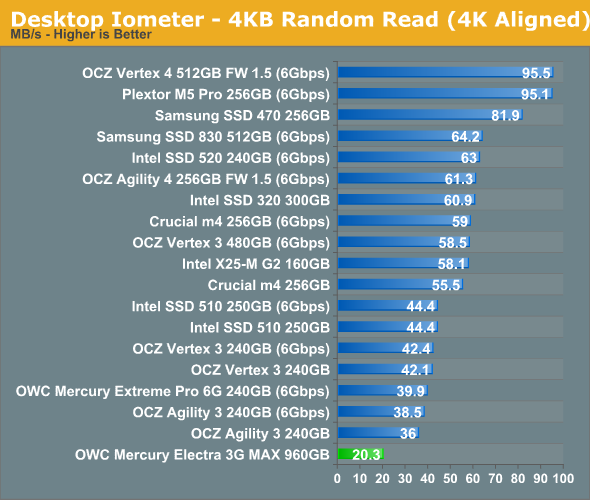
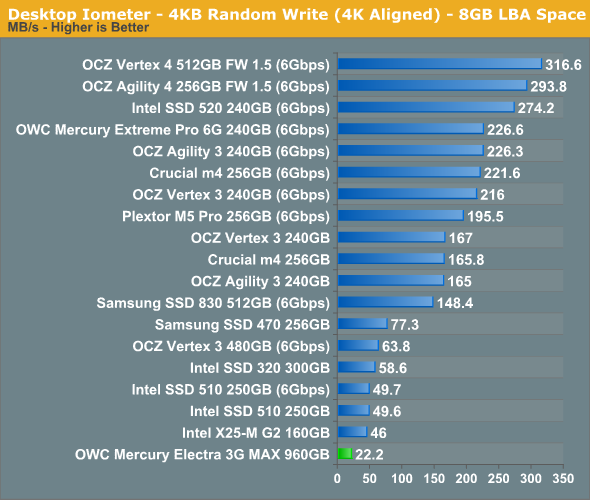
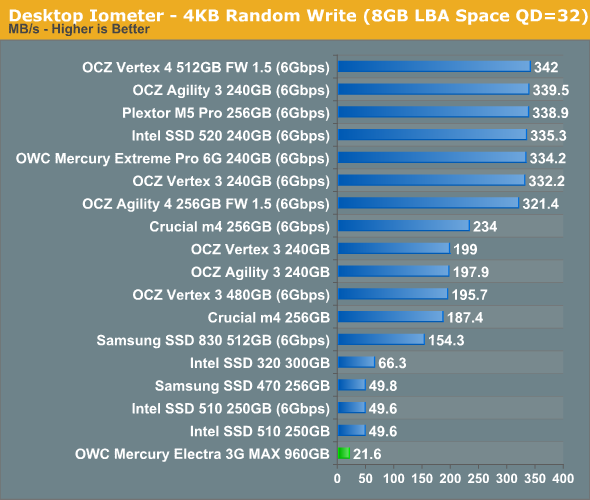
To be straight, random performance is horrible. Regardless of the queue depth and IO type (read/write), random performance tops out at around 22MB/s. I ran each test a few times to double-check but performance didn't get any better. I asked OWC if this is normal and they said it is, which also explains why OWC isn't reporting any random read/write speed figures. Ouch.
The SF-2181 controller is good for up to 60K 4KB random read/write IOPS, so that's definitely not the bottleneck. With two controllers in RAID 0, we should get random performance of over 100K IOPS at higher queue depths, although SATA 3Gbps would limit us to around 70K IOPS max. If the SSD controller is not the bottleneck, it leaves us with only one option: the RAID controller. Like I said, Siicon Image's RAID controller is not a very high-end one and the product page says it's actually a SATA to dual-eSATA controller, meaning that it's mainly aimed to be used with external hard drives, which don't offer great random IO performance to begin with. It definitely wasn't designed with SSDs in mind and I'm starting to think that OWC opted for it because there simply wasn't another viable option.
Sequential Read/Write Speed
To measure sequential performance we ran a one minute long 128KB sequential test over the entire span of the drive at a queue depth of 1. The results reported are in average MB/s over the entire test length.
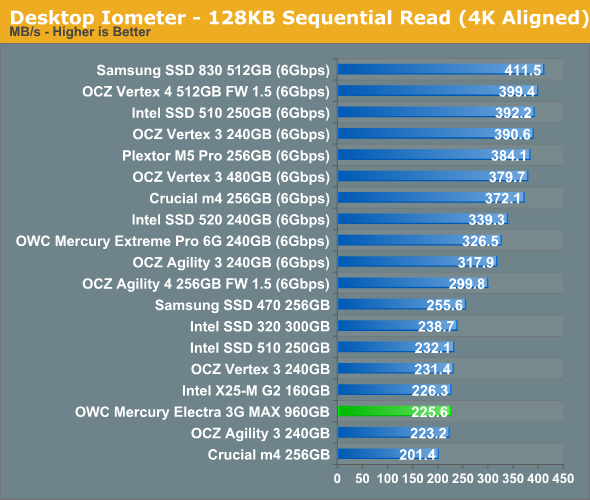
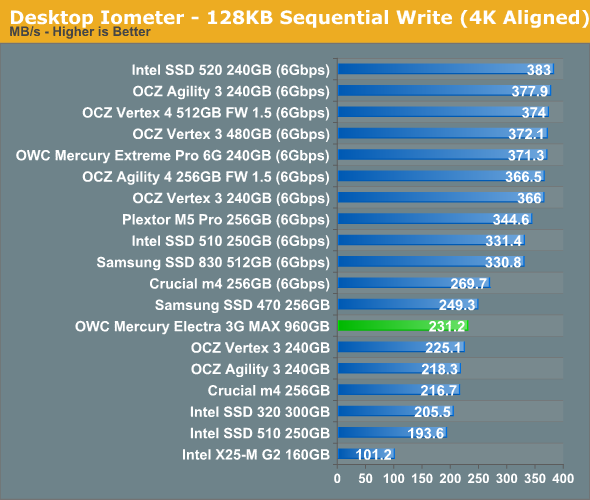
Sequential performance is much better than random speeds and now we're seeing figures typical for SATA 3Gbps SSDs. In terms of performance, there doesn't seem to be much gain from RAID 0 as for example OCZ Vertex 3 performs similarly when used in a SATA 3Gbps environment.










36 Comments
View All Comments
kmmatney - Thursday, October 18, 2012 - link
For most users, the "Light Workload" benchmark is probably the best indicator of real life performance, and here it performs close to a Crucial M4 running at 3Gbps. So not completely terrible (will feel much faster than any hard drive) but you really need to be using a 6Gbps controller to be competitive nowadays.ForeverAlone - Thursday, October 18, 2012 - link
Bloody hell, they're fast!To everyone who is moaning about £/GB or SSD storage, you are idiots for even considering using an SSD for storage.
HKZ - Thursday, October 18, 2012 - link
Maybe for big projects and similar things it's pretty dumb for a regular user, but with games about 10GB or so even on a 256GB SSD you can stuff a lot of games on there!HKZ - Thursday, October 18, 2012 - link
I have an OWC 240GB SSD SATA 3, and it's pretty fast, but at 1TB of space at this price this performance is dismal. I'm saving up for a Samsung 830 (maybe an 840) for the extra space and speed. I only use about 60GB of that 240 for OS X, and the rest for Windows 7. With a 512GB I'd have all kinds of space for my games. Yes, I game on a MacBook and I know it's not the best but it's all I've got right now. Don't kill me in the comments! XDI've got that SSD and a 1TB HDD taking the optical drive spot in my 2011 MBP and there's no way I'd pay a third of the price of my already very expensive machine for an SSD that slow. Someone will buy it, but I can't wait for an affordable 1TB SSD.
Lord 666 - Thursday, October 18, 2012 - link
Think as an iSCSI target for VSA or DAS using an older but still relevant HP DL380 G6 or G7. The 3g connection will be fine and overall performance will be much faster than 1tb SATA not to mention much cheaper than 1tb SAS.JarredWalton - Thursday, October 18, 2012 - link
But will it be reliable long-term? That's someone no one really knows without extended testing in just such a scenario.poccsx - Thursday, October 18, 2012 - link
Not a criticism, just curious, why is the Samsung 840 not in the benchmarks?Kristian Vättö - Friday, October 19, 2012 - link
I made the graphs before we had the 840, that's why (but then this got pushed back due to the 840/Pro reviews). You can always use Bench to compare any SSD to anotherciparis - Friday, October 19, 2012 - link
- it's not affordable- it's not remotely efficient
- it's quite slow
This seems like a company out of it's depth, producing a product it should have cancelled outright when the numbers became clear (it's no wonder they don't want to talk about them). Note that I'm giving them the benefit of the doubt and assuming these numbers weren't what they set out to create; if I'm wrong about that it's perhaps even more damning.
melgross - Friday, October 19, 2012 - link
You shouldn't assume, because you don't know. I wouldn't be surprised if there is a fair amount of demand for this in a laptop despite the price, performance or power draw. Some laptops have a pretty good battery life around 7 hours or so that would still have decent battery life with one of these.OWC is right that this is a good job for video editing on a laptop, and professional use for dailies in the field would be a perfect use for this.
As far as criticism of the performance goes, I remember plenty of guys here talking about how they were going to buy drives a year or two ago that had performance that was much worse for much smaller drives at a higher price per Gb. If you're loading or saving fairly large projects, a doubling of performance is very significant.
Of course, if you never have done any of that, you won't understand it either.